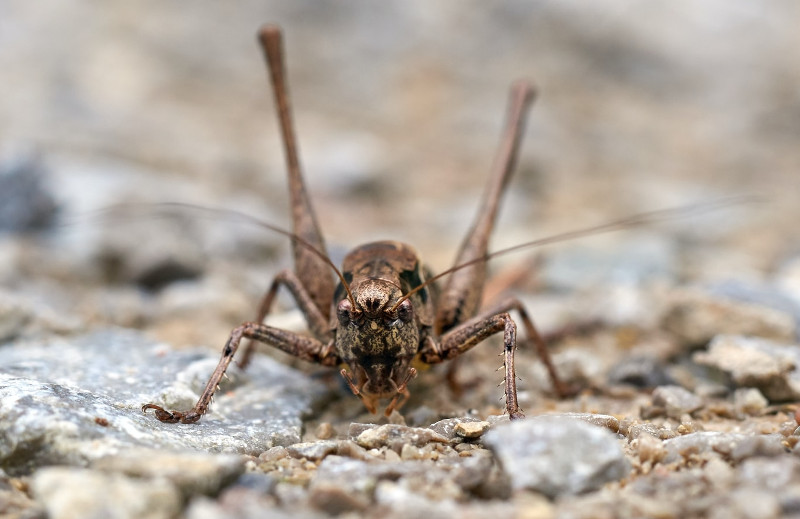In recent years, pet food manufacturers have taken giant leaps towards producing more sustainable and eco-friendly pet foods. In the pet industry, many manufacturers from around the world are focusing on sustainable farming practices, lowering their carbon footprint, and reducing waste associated with pet food production.
A growing number of pet food and treat manufacturers are taking these eco-friendly initiatives a step further by swapping traditional meats for insects. Two insects in particular, black soldier flies and crickets, are leading the way towards a future full of high quality insect-based consumables for pets.
Why insects?
Firstly, let’s buck some of the North American stigmas surrounding insect proteins. At first glance, they may appear no more than creepy crawly pests, however humans have been consuming insects dating as far back as we can measure. Ancient biblical scriptures from the third century B.C. refer to the consumption of crickets! Even today, crickets are a popular cuisine all over the world, most notably in Africa, Asia, and Latin America.
Crickets are highly sustainable. They are easy to breed and reach the end of their life cycle rapidly. They require a very small space to grow, can easily be grown indoors, and don’t have the vast land needs required by larger livestock. Additionally, crickets farms don’t have the same energy demands for heating, cooling, and other electrical needs that larger farms typically require.
According to the United Nations Food and Agricultural Organization (FAO), livestock account for almost 15% of all global greenhouse emissions. Switching from traditional animal proteins to insect-based proteins may be a win-win situation as they are strikingly nutritious and are significantly kinder to the planet.
Cricket farming creates approximately 75% less carbon dioxide and uses about 50% less water compared to chicken farming. When you compare cricket farming to lamb, pork, or beef, there is a telling disparity in the amount of resources required. Crickets are a remarkably clean protein that is low in fat protein and rich in dietary fibre. Other commonly used animal proteins do not contain fibre, making crickets that much more of an intriguing protein alternative.
Crickets are nutritional powerhouses, too. In addition to being rich in dietary fibre, they are excellent sources of vitamins and minerals as well. Crickets offer high levels of calcium, potassium, magnesium, copper, zinc, and iron. Some species of cricket are complete protein sources, meaning they contain all nine essential amino acids in the correct proportions.
Cricket-based foods are also growing in popularity for dogs with food allergies, sensitivities, and intolerances. Oftentimes, it can be difficult to pinpoint exactly which proteins an allergic pooch may be reactive to, however it’s highly unlikely that the culprit is crickets. Pet owners are flocking to insect proteins as they are among the best hypoallergenic options on the market.
Several years ago, a brand called Chirpies introduced Canada to cricket-based pet treats. Since then, we’ve seen massive growth in brands like Quebec-based brand Wilder Harrier, which offers a line of high quality pet foods and treats using crickets and black soldier flies. Recently, numerous new brands have hit the pet market, such as Mississauga-based HOPE Pet Foods, which recently launched a sustainable pet treat recipe combining bugs with berries. They also plan on launching a complete and balanced insect-based diet in the near future.
When it comes to the philosophies behind pet food brands choosing to use insect proteins in their products, there is often an eco ‘ripple effect’. Manufacturers of crickets and other insect-based pet consumables tend to be more focused on the environmental impact of their products, so they’re more likely to offer compostable and/or recycled packaging, too. As the global climate crisis continues to unfold, demand for eco-friendly and sustainable pet foods is only going to grow.
Brandon Forder, known as The Pet Expert, is vice-president of Canadian Pet Connection, an industry leader in healthy pet lifestyles. Brandon is certified in pet nutrition, and has more than twenty-five years’ experience specializing in pet health and behaviour. He has written hundreds of informative pet-related articles for newspapers, magazines, radio, and the popular Ask the Pet Expert Blog. Brandon is highly skilled in pet problem solving, and enjoys teaching others about smart and responsible pet ownership. To learn more, visit www.CanadianPetConnection.ca.












